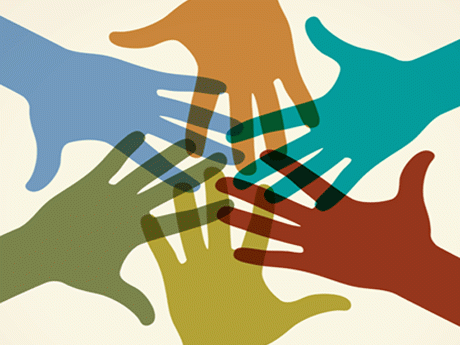by Sarah Loose
Charlottesville. The Pulse. Charleston. Portland MAX attacks. Muslim Ban. Black Lives Matter. The Women’s March. Standing Rock. #Not1More
Organizer Soya Jung coined a slogan for these times: hearts open, fists up. For those of us who practice oral history, could we adapt that slogan for our own vocation? Hearts open, fists up, microphones on?
I don’t know about you, but for me the events of the last few months have led to some soul-searching: Why am I doing what I do? Towards what end? Does the way I’m doing my work align with my deepest values and principles?
At Groundswell: Oral History for Social Change we believe that our work as oral historians can help contribute to a more just and humane world. But we also know it takes a mix of strategy, planning, resources, relationship-building and follow-through to transform good intentions into real-life impact.
At this year’s OHA, Groundswell Communications Coordinator Fanny García and I offer a new, participatory workshop to support oral history practitioners in connecting with the why of our work – and linking that back to the how.
In this Oral History for Social Change workshop, we will learn from oral history projects that have successfully mobilized the process and products of oral history to advance social change. Participants will have a chance to workshop their own projects (and project ideas): what more and what differently might you do to maximize impact?
Whether working with existing archives or generating new interviews, even simple steps can extend our discipline beyond documentation and into social activism. Take, for example, a recent project I worked on interviewing immigrant parents about their experiences of pregnancy, childbirth, and breastfeeding. We co-created a multimedia exhibit to share the parents’ stories. But we also facilitated a series of listening/strategy sessions with local health practitioners and organizers. In these sessions, participants identified concrete action steps they could take to advance immigrant parents’ self-determination and health, based on what they had heard in the interviews.
Finally, we’ll grapple, together, with some of the ethical questions that surface when employing oral history in service of social movements. We’ll consider what it means to bring an explicit anti-oppression lens to our work.
Ultimately, our aim is to equip participants with a basic framework and set of tools you can use to support your efforts to advance social justice through your oral history work.
Wanting to make a difference in the world with your work? Please join us on Wednesday, October 4th. With hearts open and fists raised, we’ll explore together what it means to turn on our microphones in these moments.

